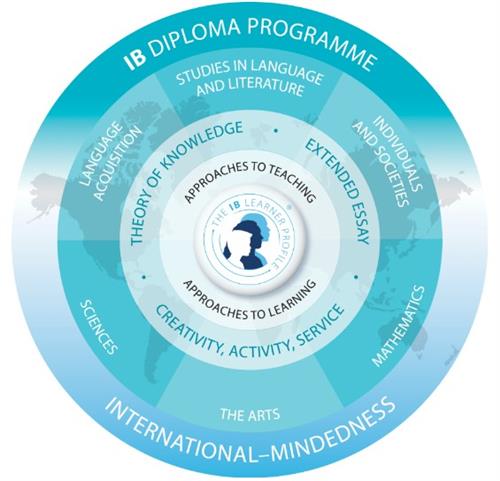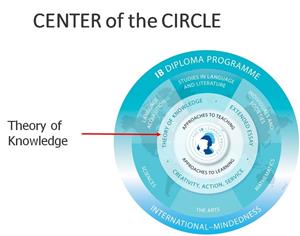- Pensacola High School
- The IB Curriculum
-
The IB Curriculum

IB Core
Theory of Knowledge (TOK)

IB Students take Theory of Knowledge courses in their junior and senior year. The course includes a thoughtful and purposeful inquiry into different ways of knowing and different kinds of knowledge. TOK is composed almost entirely of questions. The most central of these is "How do we know?". Students are taught how to be critical thinkers. Throughout discussions of questions, students gain greater awareness of their personal and ideological assumptions, as well as develop an appreciation of the diversity and richness of cultural perspectives.
Students complete a paper in their Senior Year that is graded externally by IB examiners as well as an internal presentation that is graded by their TOK teacher and moderated by IBO. Students must pass TOK to be eligible to receive an IB Diploma. The rubric is as follows:
A- Excellent
B- Good
C- Satisfactory
D- Mediocre
E- Elementary (Fail- No Diploma Awarded)
N- No Grade
Students can earn bonus points towards their diploma for their TOK Essay by being awarded certain scores by IB examiners. Bonus points can assist students who are lacking the total number needed for the IB Diploma.
Extended Essay (EE)

The extended essay is an independent, self-directed 400th, work research paper that prepares for undergraduate research presenting as formal writing. Students complete 40-60 hours of research in a subject area of their choice that relates to one of the six diploma subjects. Participation in this process develops the capacity to analyze, synthesize, and evaluate knowledge. Students analyze credible sources, develop a research question, form conclusions, and properly cite sources. Students work on their EE throughout 11th grade in their TOK Class and have it completed by the end of junior year.
-
IB Subject Group Areas
Students in the IB Diploma Programme take one course in each of the 6 IB Subject Group Areas to broaden their educational experience during their junior and senior years. At PHS, we offer different courses for students to choose from in each subject area.
Group 1: Studies in Language and Literature
Group 2: Language Acquisition
Group 3: Individuals and Societies
Group 4: Sciences
Group 5: Mathematics
Group 6: The Arts
- IB Visual Arts SL / HL
- IB Theatre SL/HL
* or another Group 3 or 4
PHS IB Electives
Freshmen and Sophomores have two electives they are able to select for their schedules. Depending on their schedule, seniors may have up to 2 electives as well. Electives are not additional IB classes. We encourage students to take classes they are interested in to find a balance between challenging themselves while still being successful! See the list below of the elective classes PHS offers:
- *NEW: AP Cyber Security (pilot)
- *AP Environmental Science
- *AP Physics
- *AP Statistics
- *AP Macroeconomics
- *AP US Government
- *AP Computer Science: Principles
- *AP Computer Science: A
- *Marine Science Honors
- *Anatomy and Physiology Honors
- Psychology 1 & 2
- Debate
- Student Government
- Journalism/Yearbook
- Digital Information Technology
- Care and Prevention of Athletic Injury
- Medical Skills Services
- Building and Construction Technique
- Culinary Arts
- Aerospace (AFJROTC)
- *FL-Pre-IB Art
- Creative Photography
- *FL-Pre IB Theatre
- Design & Production Costuming
- Design & Production Stagecraft
- Band
- Instrumental Techniques (Drumline)
- Orchestra
- Eurythmics (Colorguard)
- Music Techniques (learning to play an instrument)
- *Welding Fund. Tech. 1
*Denotes Honors Weighted Credit
Extended Essay Process
1st Nine Weeks of Junior Year
Selecting Your Topic
- It is required to select a research topic in which you had a previous or current IB Course in
- Select a topic you are truly interested in
- Talk to subject area teachers to assist in selecting a proper topic
Selecting Your Supervisor
- Go to the Extended Essay Guide and reference to see which subject your topic falls under
- Personally ask and secure a supervisor and sign up on the sheet in class
- Meet with your supervisor at least twice per month throughout Junior Year
Development of Your Research Questions
- Through research, develop sub-topics based on a broad area
- Be sure to have the specific subject guide to follow provided by your supervisor
Proposal
- Narrow your research question
- 3 sub-topic questions
- Produce an outline of your research based on your research question
- Written statement of why your research question is worthy of investigation
- A copy of all of your sources pertaining to your research question
2nd Nine Weeks of Junior Year
Writing Process
- The first 750 words of narrative will be due in October in your TOK 1 class
- Additional incremental submissions will be turned in for a grade through February of Junior year
- A completed 1st draft will be completed by March
2nd Semester of Junior Year
Final Extended (Essay) Paper
- The EE contains no reference to the student, the supervisor, or the school; it is submitted as an anonymous paper
- Due at the end of March of the junior year
- If students do not turn in an acceptable EE on the first day of senior year, they can be dismissed from the IB Program.
The Following rubric is used for the Extended Essay:
A- Excellent
B- Good
C- Satisfactory
D- Mediocre
E- Elementary (Fail- No Diploma Awarded)
N- No Grade
The Extended Essay is graded externally by IB. Students can earn bonus points towards their diploma for their Extended Essay by being awarded certain scores by IB examiners. Bonus points can assist students who are lacking the total number needed for the IB Diploma.

